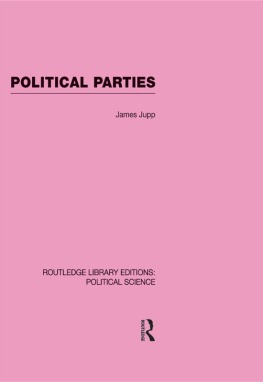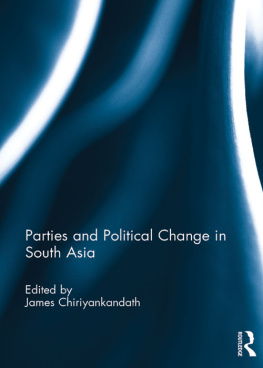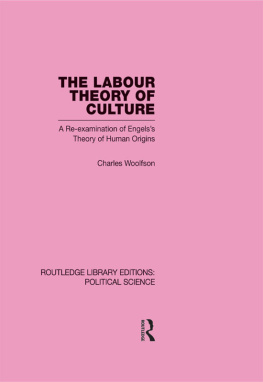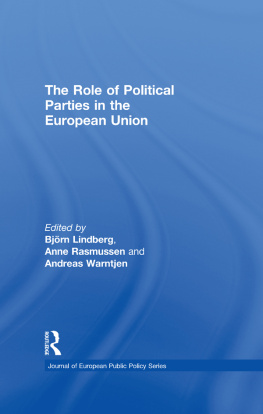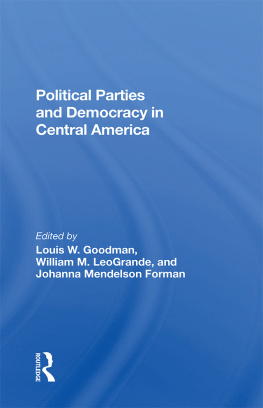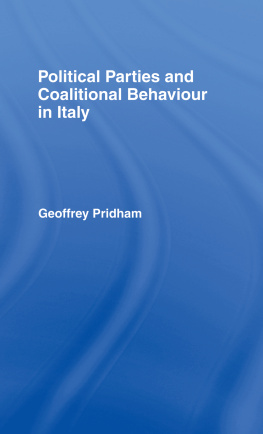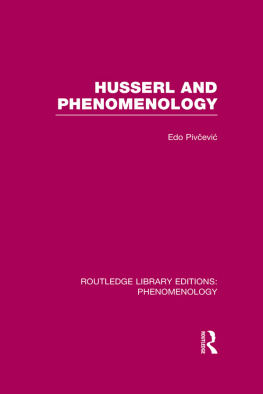ROUTLEDGE LIBRARY EDITIONS: POLITICAL SCIENCE
POLITICAL PARTIES
POLITICAL PARTIES
By
JAMES JUPP
Volume 54
First published 1968
This edition first published in 2010
by Routledge
2 Park Square, Milton Park, Abingdon, Oxon, OX14 4RN
Simultaneously published in the USA and Canada
by Routledge
270 Madison Avenue, New York, NY 10016
Routledge is an imprint of the Taylor & Francis Group, an informa business
1968 James Jupp
All rights reserved. No part of this book may be reprinted or reproduced or utilised in any form or by any electronic, mechanical, or other means, now known or hereafter invented, including photocopying and recording, or in any information storage or retrieval system, without permission in writing from the publishers.
British Library Cataloguing in Publication Data
A catalogue record for this book is available from the British Library
ISBN 10: 0-415-49111-8 (Set)
ISBN 13: 978-0-415-49111-2 (Set)
ISBN 10: 0-415-55596-5 (Volume 54)
ISBN 13: 978-0-415-55596-8 (Volume 54)
Publishers Note
The publisher has gone to great lengths to ensure the quality of this reprint but points out that some imperfections in the original copies may be apparent.
Disclaimer
The publisher has made every effort to trace copyright holders and would welcome correspondence from those they have been unable to trace.
Political Parties
by James Jupp
First published 1968
by Routledge & Kegan Paul Ltd
Broadway House, 68-74 Carter Lane
London E.C.4
James Jupp 1968
No part of this book may be reproduced in any form without permission from the publisher, except for the quotation of brief passages in criticism
SBN 7100 6094 7
General Editors Introduction
This series of monographs is designed primarily to meet the needs of students of government, politics or political science in Universities and other institutions providing courses leading to degrees. Each volume aims to provide a brief general introduction indicating the significance of its topic, e.g. executives, parties, pressure groups, etc., and then a longer case study relevant to the general topic. First-year students will thus be introduced to the kind of detailed work on which all generalisations must be based, while more mature students will have an opportunity to become acquainted with recent original research in a variety of fields. The series will eventually provide a comprehensive coverage of most aspects of political science in a more interesting and fundamental manner than in the large volume which often fails to compensate by breadth what it inevitably lacks in depth.
James Jupp, who has already written on Australian parties, attempts in this volume to apply the general classification worked out for Western parties to those of developing countries. Party systems, internal party organisation, the influence of political, economic and social systems on parties are examined, with special reference to mass radical movements. He argues that programmes, ideologies and supporting interests must be taken into account in describing party systems. On the basis of his knowledge pgof Britain and Australia he has now paid particular attention to the third world, especially in Asia, and to totalitarian systems. This is a lively addition to the literature in this field and, together with the companion volume on Pressure Groups by Frank Castles, should be widely welcomed.
H.V.W.
Preface
This book is an attempt to make some generalisations about political parties in a short enough form to be useful to the student. It is not intended as a substitute for detailed studies of particular parties nor for the classics in the comparative study of parties. Indeed its main aim is to draw attention to and comment upon, the work of others. My own contribution is largely that of extending the discussion of parties beyond the European and American systems and up to the present day. My basic proposition is that parties are indispensable to modern politics and that the absence of parties suggests that a system is governed by a traditional lite which has yet to come to terms with the modern world. From this point of view parties are neither good nor bad but simply necessary. Without them it would be impossible to legitimise modern systems, to engage the loyalty and support of the citizens. The alternative to party rule is either aristocracy or violent repression. Even under totalitarianism the party is able to mobilise mass support for the system while also using the weapons of terror. In all systems the party widens the area from which political leaders are recruited and is thus a democratising, if not necessarily a liberalising, force.
My own experience of and preference for party systems is confined to what I have called the Anglo-Scandinavian, distinct bi-partisan or social-democratic mode. Part of my aim has been to assert the claims of this type of system to serious consideration, as against the more resolutely advanced claims of American sociology on the one hand and Soviet ideology on the other. However, as I argue throughout, party systems tend to be appropriate to certain social conditions and historical circumstances and cannot be artificially created simply because one likes them. Indeed, I believe that both American and Soviet advocates have often overlooked this fact when urging systems upon other nations. This personal position of mine needs stating to avoid any pretence of complete neutrality, something rather unattainable if not worthless, when writing about party politics.
My academic interest in parties was first aroused at the London School of Economics by Professors Mackenzie and Macrae while my experience of parties has been gained through the British and Australian labour movements. My colleagues at the Universities of Melbourne and York, and in the Political Studies Associations of Britain and Australia, have been valuable critics. My wife Helen has helped me to eradicate some of the literary effects of reading too much political jargon. Finally, I must thank Mrs. Ray Nixon for typing my manuscript so quickly and efficiently.
JAMES JUPP
Party systems
The notion of party has been with us since collective deliberation became institutionalised. There were parties in the Roman Senate, in medieval Italy and in the Tudor and Stuart parliaments. They may have been bound by family or clan loyalties, by social origin or by common attitudes. Whatever the basis, party rests on the acceptance of uniformity and co-operation by those engaged in collective deliberation. Thus it is possible to have parties within Churches or trade unions which are not identical with or even related to the institutions normally referred to as political parties. The distinguishing characteristic of the political party is that it has been brought together to influence or to control the political institutions of a society. A political party may have no chance of controlling the government of a country but if it has such control as a specific aspiration then it is entitled to be classed with parties which do exercise control. The party which merely influences must have the aim of some eventual control if it is not to be classed simply as a pressure group or sect.



